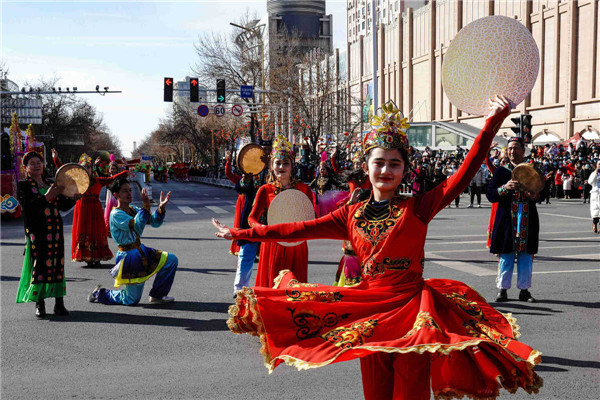Ethnic groups reap benefits of growth and unity

Uygurs perform at a festival in Hami, Xinjiang Uygur autonomous region, in February. PURAT NYAZ/FOR CHINA DAILY
Raised living standards prioritized in poverty alleviation and prosperity drive
Editor's note: China Daily is publishing a series of stories reviewing President Xi Jinping's visits at home and abroad in the past decade to showcase his vision for development in China and the world.
Born to a family of herders, Mei Hua grew up learning several languages and living with people from different ethnic groups.
Now principal of Yimin Primary School in Hulunbuir, Inner Mongolia autonomous region, she said mutual learning and harmony between ethnic groups has long been a tradition in her hometown.
Mei comes from the Ewenki ethnic group, and her grandfather and brothers all married spouses from other such groups.
As a deputy to the National People's Congress since 2018, Mei has applied the inclusive spirit she fostered at her school, which is located on grasslands about a two-hour drive from the Chinese border with Mongolia.
She said: "Our children learn songs in Mandarin, Mongolian and the Ewenki language, as well as their own ethnic dances and musical instruments. They also join interest groups to learn about languages."
Over the past decade, Mei's school has seen significant improvements, including a new heating system, internet access, a new playground, and renovated buildings, with funding provided by the authorities.
The improved conditions at the school have resulted in the number of its pupils rising from just eight in 2009 to more than 120 this year.
The development at Mei's school and the harmony among ethnic groups in Hulunbuir epitomizes China's progress in promoting growth in ethnic areas and unity among such groups.
The nation's top leadership, led by President Xi Jinping, has put forward an agenda aimed at forging a strong sense of community among the nation's 56 ethnic groups-pledging to leave none of them behind in the drive to build a moderately prosperous society and promote common prosperity.
Over the past decade, Xi, who is also general secretary of the Communist Party of China Central Committee, has visited the nation's regions that are home to ethnic groups-Xinjiang Uygur, Tibet, Ningxia Hui, Inner Mongolia and Guangxi Zhuang autonomous regions, and Yunnan, Guizhou and Sichuan provinces.
Chen Pu, deputy director of the Institute of Economic Strategy at the Tibetan Academy of Social Sciences, said, "Learning about the living conditions of people from ethnic groups has been a key part of President Xi's fact-finding tours to different regions, and raising the living standards for them has been prioritized in China's poverty alleviation and common prosperity drive."
Xi's visits have resulted in blueprints being drawn up and directions given for the development of these regions, Chen said.
China's success in lifting the 31.21 million people living in regions that are home to ethnic groups out of poverty by 2020 was a landmark achievement, he added.
Chen said Xi's call for the 56 ethnic groups to "remain tightly united like seeds in a pomegranate" has resulted in stronger exchanges and interaction among different groups.
"China's ethnic unity has now reached the best level to date," Chen said.
 Attractions
Attractions Dining
Dining Culture
Culture